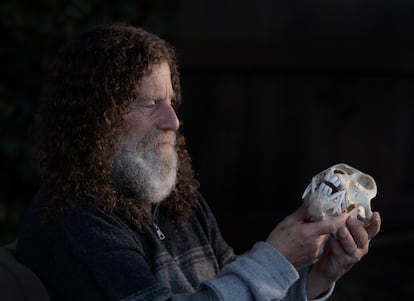Robert Sapolsky, neuroscientist: ‘Meritocracy is system justification’
In his latest book, ‘Determined,’ the researcher uses biology to make the case that free will does not exist, an idea that raises moral doubts about the concepts of guilt, punishment, merit and effort

He may be one of the great behavioral scientists, but Robert Sapolsky, 66, does not believe there is any merit to that. He doesn’t say it out of modesty, but out of conviction. This prolific author believes that free will is an illusion, that our conscious decisions are really the consequence of unconscious processes in the brain. Sapolsky spent three decades studying baboons in the wild in Kenya, but has since gone on to write world-renowned books on his deterministic theory of human behavior. In his new book, Determined, he develops this idea further by drawing on neurology, philosophy and sociology. It’s not you, it’s not me, it’s determinism. The phrase, in addition to being the best of excuses, raises moral doubts about the concepts of guilt, punishment, merit and effort. We asked him about them in a video call conversation.
Question. You maintain that free will does not exist. How then is a concrete action formed, a decision over which we believe we have control?
Answer. A behavior is the end product of what happened in your brain a second ago, of environmental stimuli, which condition those neurons in your brain to do what they did a second ago. And the hormones you had in your bloodstream this morning. And what happened to you in the last few months. Your brain may have changed its structure during your adolescence, childhood, or fetal life. Either because of your genes or because of the culture in which you have grown up. It is biology, over which we have no control, interacting with the environment, over which we have no control. And when you look at all of these influences, you realize that neurobiology influences your decisions, as does genetics, geochronology and social psychology. It is not that all these disciplines are different, but that they become one discipline.
Q. So, the fact that you have written a book, the fact that you are giving an interview right now about this book... Hasn't it depended on your effort and will?
A. If you think that there is no free will, it makes no sense to blame people for their mistakes or congratulate them for their achievements. But it’s incredibly difficult to think like that. Writing this book was a lot of work, but I managed to do it and there is an ‘I’ in this whole process that somehow did it. But if I really stop and analyze it, I understand that I finished the book because of the type of person I am. And that is due to many events that are beyond my control. I have to stop and review all the events, over which I had no control, that made me the type of person I am right now. It takes a lot of work to do it, and to not fall into the belief that you earned what you are and other people didn’t earn it.
Q. So much so that almost no one does it. Why is the concept of meritocracy so fashionable?
A. The people who have the most power are the ones who have the most reason to like meritocracies and keep them in place. It’s system justification. We may think that meritocracy makes no sense. But on the other hand, if you have a brain tumor, you’ll want to make sure you’re operated on by a great doctor, not some random person off the street. You need to make sure that competent people are doing the difficult jobs, without telling them that they’re better humans as a result of that, and without having them think that in any way they earned that. The problem with this idea is that it can kill motivation.
Q. And that can generate frustration. Not everyone can be a great doctor.
A. I think the United States is a particularly strong example of that. Because we have this incredibly strong cultural mythology in the United States, that anybody, if they work hard, can succeed. Anybody can become rich, if they’re motivated enough, any child can grow up to be president. And, you know, in the United States, if you’re born in poverty, there’s about 90% chance that you will still be in poverty as an adult. And every step of the way will explain why that is so. Your neighborhood, your education... However, we have a country where the entire mythology is built on the idea that it is in your power to solve any problem, it only depends on you. Because, look, here’s one person in a million who did it. And we’re going to make it sound like everybody can be there. So at least in the United States, where we have this really poisonous version of meritocracy, it causes an enormous amount of pain.
Q. If free will does not exist, what happens to concepts like guilt and punishment?
A. If a person is dangerous, but it is not their fault, we have to protect people from them, but doing the absolute minimum. More than a prison, they should be put in a kind of quarantine. If someone is violent, you have to stop them from doing harm, but that doesn’t mean it’s their fault.
Q. You give as an example the cases of police officers shooting Black suspects in the United States. Situations in which social racism has more weight than concepts such as guilt or will. It is an uncomfortable reflection…
A. Yes, because it is much easier to look at someone who doesn’t have much education and who hasn’t had much success in life and empathize and say that circumstances made them who they are. But if you have to look at a police officer who just shot an unarmed man simply because of the color of his skin; because in half a second he thought that that person who was holding a phone was pointing a gun at him... It’s a lot harder to sit and look at them and say, they’re just the end product of how they turned out that way.
Q. How does determinism affect love? Maybe saying “I do” at a wedding is not as accurate as saying, “Yes, as fate would have it”?
A. This is another field where determinism poses a huge challenge. If you are lucky enough to have fallen in love and been reciprocated, this idea has the potential to turn a very nice thing into something depressing. What if my marriage had happened only because of the levels of oxytocin we had in our brains? What if this love story comes down to a question of pheromones? What if we are together only because we were raised in similar cultural contexts? It’s totally depressing. But you have to accept that there is a structure beneath the surface. There is an underlying mechanistic biology in something as lyrical as love. And well, if you think about it it shouldn’t be depressing, because that means you’ve had the luxury of experiencing it.
Q. You spent decades working with baboons. How did you end up devoting yourself to refuting free will in humans?
A. The baboon work I did for many years in East Africa ended up being a small piece of this whole story. We studied the neurobiology of stress, what stress does to the brain. The fieldwork attempted to relate the baboons’ social rank to who handles stress well and who had poor blood pressure. I spent 30 years thinking about nothing more than that. And in the years since, I started to look outward and say, “Well, this is just one of the many little slivers. When you put them all together you can see the complexity of the biological machines that we are. And you conclude that no, there is no free will.
Sign up for our weekly newsletter to get more English-language news coverage from EL PAÍS USA Edition
Tu suscripción se está usando en otro dispositivo
¿Quieres añadir otro usuario a tu suscripción?
Si continúas leyendo en este dispositivo, no se podrá leer en el otro.
FlechaTu suscripción se está usando en otro dispositivo y solo puedes acceder a EL PAÍS desde un dispositivo a la vez.
Si quieres compartir tu cuenta, cambia tu suscripción a la modalidad Premium, así podrás añadir otro usuario. Cada uno accederá con su propia cuenta de email, lo que os permitirá personalizar vuestra experiencia en EL PAÍS.
¿Tienes una suscripción de empresa? Accede aquí para contratar más cuentas.
En el caso de no saber quién está usando tu cuenta, te recomendamos cambiar tu contraseña aquí.
Si decides continuar compartiendo tu cuenta, este mensaje se mostrará en tu dispositivo y en el de la otra persona que está usando tu cuenta de forma indefinida, afectando a tu experiencia de lectura. Puedes consultar aquí los términos y condiciones de la suscripción digital.









































